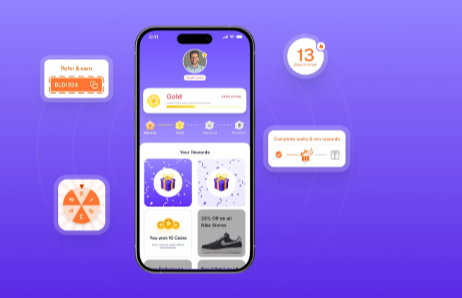Gamification in Fitness Apps: How to Design Habit-Forming UX That Drives Real Engagement

The fitness app market has experienced unprecedented growth, with global revenue reaching $4.4 billion in 2023 and projected to hit $15.2 billion by 2028, according to Statista. Yet despite this explosive growth, the average fitness app sees a 77% user drop-off rate within the first week of download. This stark reality reveals a critical challenge: while users are eager to embrace digital fitness solutions, keeping them engaged requires more than basic tracking features.
The solution lies in gamification—a strategic approach that transforms mundane fitness routines into compelling, habit-forming user experiences. Research from the Journal of Medical Internet Research shows that gamified fitness apps increase user retention by 47% and boost daily active usage by 31% compared to traditional fitness applications. Users of gamified fitness platforms are 3x more likely to maintain their fitness routines beyond the critical 21-day habit formation period.
Understanding the Psychology Behind Fitness Gamification
The effectiveness of gamification in fitness apps stems from fundamental psychological principles that drive human behavior. When users complete workout challenges, earn achievement badges, or climb leaderboards, their brains release dopamine—the same neurotransmitter associated with natural rewards and motivation.
This psychological response creates what behavioral economists call a “variable ratio reinforcement schedule,” where users receive unpredictable rewards that keep them coming back. The Self-Determination Theory identifies three core psychological needs: autonomy, competence, and relatedness. Gamification elements that allow users to choose their own fitness paths (autonomy), demonstrate progress through achievable milestones (competence), and connect with like-minded communities (relatedness) create intrinsic motivation that sustains long-term usage.
Core Gamification Elements That Drive Engagement
Points and Scoring Systems
Points serve as the foundation of most gamified fitness experiences, providing immediate feedback and quantifiable progress indicators. Effective point systems go beyond simple step counting or calorie tracking, creating multi-layered scoring mechanisms that reward consistency, improvement, and exploration of different fitness activities.
Dynamic point multipliers add excitement by increasing rewards during specific time periods or for completing challenging workouts. The key to effective point systems lies in meaningful progression curves where users feel regular advancement without making achievements too easy to obtain.
Achievement Systems and Badges
Well-designed achievement systems create multiple pathways to success, accommodating different user preferences and fitness levels. Rather than focusing solely on performance metrics, comprehensive badge systems recognize consistency, variety, social engagement, and personal improvement.
Progressive achievement tiers keep users motivated by providing both short-term wins and long-term aspirations. Hidden or surprise achievements add an element of discovery that encourages exploration of app features, creating positive emotional responses that often lead users to try activities they might otherwise ignore.
Leaderboards and Social Competition
Social comparison theory suggests that people evaluate their own abilities relative to others, making leaderboards powerful motivational tools. Effective leaderboard design requires careful consideration of user psychology and fairness principles.
Tiered leaderboards that group users by similar fitness levels prevent newcomers from being discouraged by advanced athletes. Weekly or monthly leaderboard resets ensure that all users have regular opportunities to achieve high rankings, maintaining competitive energy and giving everyone chances to experience the motivation that comes from leaderboard success.
Advanced Gamification Strategies for Sustained Engagement
Narrative and Storytelling Integration
The most innovative fitness apps now incorporate storytelling elements that transform workouts into adventures. Zombie survival running games, fantasy quest cycling adventures, or space exploration walking challenges create emotional investment beyond simple fitness tracking.
Character progression systems where users unlock new abilities, equipment, or story elements based on their real-world fitness achievements create powerful connections between physical activity and digital rewards. These systems make every workout feel purposeful within a larger context.
Personalization and Adaptive Challenges
Machine learning algorithms enable fitness apps to create personalized gamification experiences that adapt to individual user behavior patterns. Smart challenge recommendation engines analyze user preferences, success rates, and seasonal patterns to suggest activities with optimal engagement potential.
Behavioral trigger systems can identify when users are at risk of disengagement and automatically deploy targeted gamification interventions to re-establish momentum when activity levels drop.
5 Most Trusted App Development Companies for Fitness Gamification in the USA
1. GeekyAnts – San Francisco
GeekyAnts is a global technology consulting firm specializing in digital transformation, end-to-end app development, digital product design, and custom software solutions. With extensive expertise in fitness app development and gamification strategies, GeekyAnts has delivered innovative mobile solutions for clients across various industries, including healthcare, fitness, and wellness sectors.
The company’s approach to fitness app development combines user experience design with advanced technology implementation, creating engaging platforms that drive real user behavior change. Their development team has particular expertise in React Native, Flutter, and native iOS/Android development, enabling them to build cross-platform solutions that maintain high performance standards.
GeekyAnts’ fitness app projects typically incorporate comprehensive gamification frameworks, including achievement systems, social features, and personalized challenge mechanisms. Their design philosophy emphasizes user psychology and behavioral science principles, ensuring that gamification elements create genuine engagement rather than superficial interactions.
Contact Details: Address: GeekyAnts Inc, 315 Montgomery Street, 9th & 10th floors, San Francisco, CA, 94104, USA, Phone: +1 845 534 6825, Email: info@geekyants.com, Website: www.geekyants.com/en-us, Clutch Rating: 4.9/5 (100+ reviews)
2. Intellectsoft
Intellectsoft focuses on custom software development with particular strength in mobile app solutions for healthcare and fitness industries. Their fitness app development services include comprehensive gamification implementation, wearable device integration, and advanced analytics capabilities. The company has worked with startups and enterprise clients to create fitness platforms that combine engaging user experiences with robust technical infrastructure.
Their development approach emphasizes scalable architecture design and comprehensive testing protocols, ensuring that gamified fitness apps can handle growing user bases while maintaining performance standards. Intellectsoft’s team includes specialists in IoT integration, enabling seamless connectivity with fitness trackers and smart devices.
Contact Details: Address: 700 Pennsylvania Avenue SE, Washington, DC 20003, USA, Phone: +1 202 774 5011, Clutch Rating: 4.7/5 (45 reviews)
3. WillowTree
WillowTree specializes in mobile app development and digital product strategy, with notable experience in fitness and wellness applications. Their approach combines user research, design thinking, and technical implementation to create fitness apps that successfully engage users through gamification elements. The company has worked with major fitness brands to develop platforms that integrate social features, achievement systems, and personalized challenges.
Their development methodology includes comprehensive user testing and iterative design processes that ensure gamification elements resonate with target audiences. WillowTree’s team includes behavioral psychology consultants who inform gamification strategy development, creating evidence-based engagement mechanisms.
Contact Details: Address: 107 SE Washington Street, Charlottesville, VA 22902, USA, Phone: +1 434 261 4280, Clutch Rating: 4.6/5 (38 reviews)
4. Y Media Labs
Y Media Labs combines strategic consulting with technical development services, offering comprehensive fitness app solutions that incorporate advanced gamification features. Their approach emphasizes brand strategy integration, ensuring that gamification elements align with client brand identity while driving user engagement. The company has experience developing fitness platforms for both B2C and B2B markets.
Their technical capabilities include artificial intelligence integration, enabling personalized gamification experiences that adapt to individual user behavior patterns. Y Media Labs’ development process includes extensive prototype testing and user feedback incorporation, ensuring final products deliver meaningful engagement improvements.
Contact Details: Address: 101 2nd Street, San Francisco, CA 94105, USA, Phone: +1 415 230 3800, Clutch Rating: 4.4/5 (29 reviews)
Read Also: Not Just a Pretty Homepage: How a Website Design Agency in Charlotte Builds Full-Funnel Sites
5. ArcTouch
ArcTouch focuses on mobile app development with significant experience in fitness and wellness applications. Their development approach includes comprehensive gamification planning, user experience optimization, and technical implementation services. The company has worked with fitness startups and established wellness brands to create engaging mobile platforms that drive user retention through strategic gamification implementation.
Their technical expertise includes cross-platform development capabilities and integration with popular fitness tracking devices and platforms. ArcTouch’s design team specializes in creating intuitive interfaces that make gamification elements feel natural and motivating rather than forced or artificial.
Contact Details: Address: 101 California Street, San Francisco, CA 94111, USA, Phone: +1 415 594 5800, Clutch Rating: 4.3/5 (22 reviews)
Measuring Success: Key Performance Indicators for Gamified Fitness Apps
Effective measurement of gamification success requires tracking multiple engagement indicators beyond simple download numbers. Daily Active Users (DAU) and Monthly Active Users (MAU) provide baseline engagement measurements, while retention cohort analysis reveals how effectively gamification elements maintain long-term user interest.
Session frequency and duration metrics indicate how compelling users find the gamified experience. Successful fitness apps typically see average session lengths increase by 40-60% after implementing comprehensive gamification systems. Feature usage distribution analysis helps identify which gamification elements drive the most engagement.
The ultimate goal of fitness app gamification extends beyond digital engagement to real-world behavior modification. Workout frequency increases, consistency improvements, and activity variety expansion serve as primary success indicators. Apps that successfully drive behavior change typically see 65% of users completing at least one significant fitness milestone within their first month.
Future Trends in Fitness App Gamification
The next generation of fitness app gamification will leverage AI to create hyper-personalized experiences that adapt in real-time to user behavior, preferences, and performance patterns. Machine learning algorithms will analyze user interaction data to optimize reward timing, challenge difficulty, and social feature presentation for maximum engagement.
Immersive technology integration will transform fitness app gamification by creating fully engaging virtual environments where physical activity becomes part of expansive digital worlds. AR-enabled outdoor workouts will overlay gamification elements onto real-world environments, turning neighborhood runs into treasure hunts or adventure quests.
Conclusion
The intersection of gamification and fitness app design represents one of the most promising approaches to solving the persistent challenge of user engagement in digital wellness platforms. Successful gamification goes far beyond surface-level point systems and badges—it requires a deep understanding of human psychology, behavioral science, and user experience design principles.
The data demonstrates that thoughtfully implemented gamification strategies can dramatically improve user retention, session duration, and most importantly, real-world behavior change. Apps that successfully integrate progressive achievement systems, social competition features, and personalized challenges see retention rates nearly 50% higher than traditional fitness applications.
For product owners, founders, and technology leaders considering fitness app development, gamification isn’t just a nice-to-have feature—it’s essential for creating sustainable user engagement and driving meaningful behavior change. The companies that will succeed in this competitive landscape are those that prioritize user psychology, invest in sophisticated gamification systems, and continuously iterate based on user feedback and engagement data.




